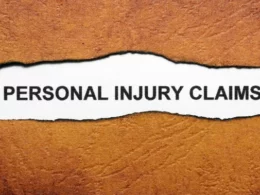Are you worried about what might happen if you or someone else is injured in a car accident? Do you wonder if your car insurance will cover personal injury claims? These are valid concerns that many drivers have, and it’s important to understand your insurance policy and what it covers. The last thing you want is to be caught off guard and facing unexpected expenses in the event of an accident.
But don’t worry, we’re here to help. In this article, we’ll explain what personal injury coverage is and how it works. We’ll also discuss some of the challenges that drivers face when it comes to making personal injury claims, including dealing with insurance companies and medical bills.
We hope that when you have finished reading this article, you’ll have a clear understanding of what your car insurance policy covers and how to navigate the process of making a personal injury claim. So sit back, relax, and let us guide you through the world of car insurance and personal injury claims.
Personal Injury Claims & Car Insurance
If you are involved in a car accident, you may be wondering if your car insurance covers personal injury claims. In this section, we will discuss the different types of car insurance coverage that can help pay for injuries sustained in a car accident.
What is Personal Injury Protection (PIP)?
Personal Injury Protection (PIP) is a type of car insurance coverage that pays for medical expenses and lost wages for you and your passengers in the event of a car accident, regardless of who is at fault. PIP is required in no-fault states like Florida, Hawaii, Kansas, Massachusetts, Michigan, Minnesota, New Jersey, New York, North Dakota, Oregon, Pennsylvania, and Utah. In other states, PIP is optional.
What is Liability Coverage?
Liability coverage is a type of car insurance that pays for damages and injuries you cause to others in a car accident. If you are at fault in an accident, your liability coverage can help pay for the other driver’s medical bills, property damage, and other damages. Liability coverage is required in most states.
What is Medical Payments Coverage?
Medical Payments Coverage, also known as MedPay, is a type of car insurance that pays for medical expenses for you and your passengers in the event of a car accident, regardless of who is at fault. MedPay is optional in most states, but it can be a helpful addition to your car insurance policy if you want extra protection for medical bills.
When it comes to personal injury claims, it is important to understand your car insurance coverage and how it works. If you are injured in a car accident, your car insurance company may provide benefits to help cover your medical bills, lost wages, and other expenses related to your injuries. However, the amount of benefits you receive will depend on your policy’s coverage limits.
If you are involved in a car accident and are injured, it is important to seek medical attention right away. You should also contact your car insurance company to report the accident and file a claim. An adjuster will be assigned to your case to investigate the accident and determine the amount of benefits you are entitled to.
In some cases, you may need to hire a personal injury lawyer to help you navigate the claims process and negotiate with your insurance company. If you are not at fault in the accident, you may also be able to sue the other driver for damages, including medical bills, lost income, and pain and suffering.
Overall, understanding your car insurance coverage and personal injury laws in your state can help you protect yourself and your passengers in the event of a car accident.
Determining Fault
Determining fault in a car accident is crucial in determining who is responsible for paying for damages and injuries. In this section, we will discuss how fault is determined in both no-fault and liability coverage.
What is No-Fault Insurance?
In some states, including Texas, drivers are required to have no-fault insurance. This means that regardless of who caused the accident, each driver’s insurance company pays for their own medical expenses and lost wages. However, this coverage does not include damages to the vehicles involved in the accident.
How is Fault Determined in Liability Coverage?
In states without no-fault insurance, liability coverage is used to determine fault in a car accident. Liability coverage pays for damages and injuries to the other driver if you are found to be at fault.
To determine fault, insurance adjusters look at several factors, including:
- Police reports
- Witness statements
- Traffic laws in the state
- Photos of the damage to the vehicles
In most cases, the driver who is found to be at fault is responsible for paying for damages and injuries to the other driver. However, in some cases, both drivers may be found to be partially at fault. In these cases, the percentage of fault is determined by the insurance adjuster and damages are divided accordingly.
It is important to note that fault is determined on a case-by-case basis and can vary depending on the state. Some states have comparative negligence laws, which means that damages are divided based on the percentage of fault of each driver. Other states have contributory negligence laws, which means that if a driver is found to be even partially at fault, they cannot recover damages from the other driver.
In summary, determining fault in a car accident is a complex process that varies depending on the state and the circumstances of the accident. If you are involved in a car accident, it is important to contact your insurance company and seek legal advice to ensure that you are properly compensated for any damages or injuries.
Filing a Personal Injury Claim
If you’ve been injured in a car accident, your car insurance policy may cover your medical bills and other expenses related to your injuries. Here’s what you need to know about filing a personal injury claim with your car insurance company.
What to Do After an Accident
After a car accident, the first thing you should do is seek medical attention for any injuries you or your passengers may have sustained. Once you’ve received medical treatment, you should contact your car insurance company to report the accident and begin the claims process.
When you speak to your insurance company, be sure to provide them with all the details of the accident, including the date, time, and location, as well as the names and contact information of any witnesses. You should also provide your insurance company with a copy of the police report, if one was filed.
Submitting Medical Bills
If you’ve been injured in a car accident, you may have medical bills that need to be paid. To submit your medical bills to your car insurance company, you should provide them with copies of all the bills and receipts related to your medical treatment.
Your insurance company may also require you to sign a medical release form, which will allow them to access your medical records and verify the treatment you received.
Working with an Adjuster
Once you’ve submitted your medical bills to your insurance company, they will assign an adjuster to your case. The adjuster will review your claim and determine how much your insurance company is willing to pay to reimburse you for your medical bills and other expenses related to your injuries.
To work with your adjuster, you should be prepared to provide them with any additional information they may need to process your claim. You should also keep detailed records of all your expenses related to your injuries, including medical bills, transportation costs, and lost wages.
By following these steps, you can file a personal injury claim with your car insurance company and receive the reimbursement you need to recover from your injuries.
Understanding Coverage Limits
When it comes to car insurance, understanding coverage limits is crucial. Coverage limits refer to the maximum amount your insurance company will pay out for a claim. In other words, it’s the maximum amount of protection you have in case of an accident or injury.
What are Coverage Limits?
Car insurance policies typically have two types of coverage limits: bodily injury liability and property damage liability. Bodily injury liability coverage pays for medical expenses and lost wages for other drivers and passengers if you are at fault in an accident. Property damage liability coverage pays for repairs or replacement of another person’s property if you cause damage in an accident.
How Much Coverage Do You Need?
The amount of coverage you need depends on several factors, such as your state’s minimum requirements, your assets, and your risk tolerance. Most states require a minimum amount of liability coverage, but it may not be enough to cover all damages and injuries in a serious accident.
It’s recommended that you have enough liability coverage to protect your assets in case of a lawsuit. If you have substantial assets, you may want to consider increasing your liability coverage to protect them.
In addition to liability coverage, you may want to consider adding medical payments coverage or personal injury protection (PIP) to your policy. Medical payments coverage pays for medical expenses for you and your passengers regardless of who is at fault in an accident. PIP is similar to medical payments coverage but also covers lost wages and other expenses related to injuries from a car accident.
No-fault car insurance is another option available in some states. With no-fault insurance, each driver’s insurance company pays for their own medical expenses and lost wages, regardless of who caused the accident.
In conclusion, understanding coverage limits is an important part of choosing the right car insurance policy. It’s important to consider your state’s minimum requirements, your assets, and your risk tolerance when deciding how much coverage you need. Adding medical payments coverage or PIP to your policy can provide additional protection in case of an accident.
Frequently Asked Questions
Does my car insurance cover medical expenses?
Your car insurance policy may include medical payments coverage or personal injury protection (PIP) coverage that can help pay for medical expenses if you are injured in a car accident, regardless of who is at fault. However, not all car insurance policies include these coverages, so it’s important to review your policy or speak with your insurance agent to determine if you have this coverage.
What does personal injury protection cover?
Personal injury protection (PIP) coverage is a type of car insurance that can help pay for medical expenses, lost wages, and other damages if you are injured in a car accident. PIP coverage is often required in no-fault states, but it may also be optional in other states. PIP coverage typically covers medical expenses, lost income, and other related expenses.
Does bodily injury liability insurance cover pain and suffering?
Bodily injury liability (BI) insurance is a type of car insurance that can help pay for damages if you are at fault in a car accident that results in injuries to another person. BI insurance typically covers medical expenses, lost income, and other related expenses, but it may not cover pain and suffering.
Which injuries are covered under personal injury liability?
Personal injury liability (PIL) insurance is a type of car insurance that can help pay for damages if you are at fault in a car accident that results in injuries to another person. PIL insurance typically covers medical expenses, lost income, and other related expenses, but it may not cover pain and suffering.
Do I need PIP insurance if I have health insurance?
If you have health insurance, you may not need PIP insurance, but it depends on the specifics of your health insurance policy. Some health insurance policies may not cover injuries sustained in a car accident, while others may have limitations on coverage. It’s important to review your health insurance policy and speak with your insurance agent to determine if you need PIP insurance.
What are the coverage limits for bodily injury liability insurance?
The coverage limits for bodily injury liability insurance vary depending on your policy and state requirements. It’s important to review your policy or speak with your insurance agent to determine your coverage limits and ensure that you have adequate coverage in the event of a car accident.
Conclusion
Supposing you have been in a car accident, one of the first things you may wonder is whether your car insurance policy covers personal injury claims. The answer to this question depends on the type of insurance coverage you have. Personal injury protection (PIP) is a type of car insurance coverage that can cover medical expenses and lost wages for you and your passengers, regardless of who was at fault for the accident. PIP is required in some states and optional in others.
If you live in a state that requires PIP coverage, your car insurance policy will automatically include it. However, if you live in a state where PIP is optional, you will need to decide whether to add it to your policy. Keep in mind that even if PIP is not required in your state, it can be a valuable type of coverage to have. In the event of an accident, PIP can help cover medical expenses and lost wages, which can be significant costs to bear on your own.
YOU SHOULD ALSO READ:












